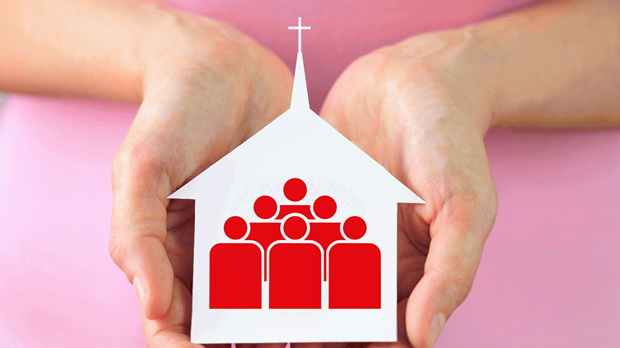My Church, My Family

Last spring my husband and I experienced a first: we contracted a virus at the exact same time. Until then, our illnesses had always been staggered, out of sync just enough that we could still take care of another.
But not this time. This time it hit us full force, on the same day, within the same hour. Even worse, it was a stomach virus, so there was only one thing to do: each of us fled to separate bathrooms where we lay pathetically wrapped around our own respective toilets. It was every man for himself.
I would have stayed by that toilet the rest of the night had we not been the parents of an 18-month-old son who, incidentally, was wandering around the house unattended. Both my husband and I were too incapacitated to watch him. We had no family close by, and we didn’t want our friends to enter our plague-ridden home. So, I started to panic.
Help!
Eventually, desperation won the day. Between imposing on our friends and letting our son have free reign of the house, there was only one clear choice. I picked up the phone and called a friend from church.
That experience is among only a handful of times when I have been needy enough to ask my church for help. On another occasion, I had to go to the hospital while my husband was out of town, so I called a church member. Apocalyptic illnesses aside, I don’t depend on my church for much—not like I depend on my family.
That’s one of the reasons my husband and I recently moved back to North Carolina from Chicago. It was hard being so far from family. We needed help with our son, and our Chicago-area church could not support us the way our blood-related family members could. I felt isolated and burned out, so we picked up our things and moved back South.
That strain is a reality for many young mothers. Raising small children is hard work, made all the more difficult by a lack of support. Those of us who do not live near our parents—or whose parents live nearby but are unable to help—are stretched impossibly thin.
That’s because, in my experience, family is more dependable than the church. My friends who live far from family are, on the whole, way more stressed out and exhausted than those with family close by. Of course there are exceptions, but most of us depend on our families to do things we would never dream of asking our church friends. That’s reality.
The question is, is it biblical?
Family Redefined
Very often, American Christians treat the family as the most basic and most important unit of Christian life. Countless books and sermons are devoted to guarding the family, saving the family, and fighting for the family. The rise of divorce, out-of-wedlock births, and gay marriage are seen as “attacks” on the family that must be fended off.
To some extent, this emphasis on the family is rooted in Scripture. Paul exhorts husbands to love their wives, wives to honor their husbands, and children to obey their parents (). Likewise, Jesus opposed divorce (). Our priority on family wasn’t plucked from thin air.
However, the question is not whether the family is good—the question is whether the family is primary. Is the family more essential to Christian life than the church?
To answer this question, consider Christian families of the early church. In his book Families at the Crossroads, Rodney Clapp traces the evolution of the family. He explains that the concept of the traditional family is not really “traditional” at all. It is a modern invention brought on by the Industrial Revolution.
Prior to the Industrial Revolution, both men and women worked in the home and the children helped. Marriages were often arranged, and family was about economic survival. Love and intimacy were not absent from early families, but they certainly were not central.
Furthermore, “family” was not understood as the nuclear unit of two parents and their kids. Clapp writes that in ancient Israel, the “average Hebrew household numbered closer to 50 or 100 people.” That’s because, according to Clapp, “The Israelites had no real conception of a nuclear family. What we call the nuclear family they saw seamlessly woven into the multigenerational extended family . . . So a Hebrew household or family would actually be a small village.”
Fast-forward to the early church, where Christian families were similarly large and open, though for a different reason. In Matthew 12:50, Jesus redefined family when he stated, “Anyone who does the will of my Father in heaven is my brother and sister and mother.” As a result of this new definition of family, the line between family and the church was porous. Unlike today, in which the family is a separate, private sphere, early Christian families made less of a distinction between the public and private parts of their lives.
Instead, Christian homes were community bases for the work of the local church. The Christian home was the location for church worship services and care for the poor. So when Titus 2:5 instructs women to be “busy at home” (NIV), that’s not necessarily a reference to the family. It’s a reference to serving the church.
In addition to historical precedent, consider Jesus’ warnings about prioritizing the family above the gospel. In Luke 14:26 Jesus cautions, “If you want to be my disciple, you must hate everyone else by comparison—your father and mother, wife and children, brothers and sisters—yes, even your own life. Otherwise, you cannot be my disciple.” Jesus’ words should certainly be understood within the larger context of Scripture, which clearly exhorts Christians to honor their parents and love their spouses. However, Jesus’ basic message is this: when you follow him, you have a new family.
All of that to say, both historical precedent and biblical witness are clear. The most basic “family” of the Christian disciple is not one of biological relatives but the church.
Family Values
In a world as broken as ours, that message is not only countercultural but also full of hope. It gives hope to singles, orphans, widows, and young parents like me. In fact, it gives hope to any person who has experienced the brokenness or shortcomings of family in this world. And really, isn’t that all of us?
That’s the thing about “traditional” family: it’s an illusion. It’s also exclusive. It is a conception of family so narrow that it marginalizes countless vulnerable individuals—orphans, singles, widows—the very sort of folks Jesus called us to serve.
That’s why it is important for Christians to hold up the church, not the family, as our top priority. That’s not to say we should neglect our families, but we should reevaluate what “Christian family” actually means. Christians must do away with the notion of family as a pure and separate haven from an otherwise sinful world. The purpose of the family is not to preserve but to serve. The family is not an exclusive nuclear unit but an open hub of mission and hospitality.
This alternative vision of family is radical. To open our families in the way of the early church is hard. It means allowing people into the messiness of our lives. It means giving of our time when it’s not always convenient. And it means having the humility to ask for help when we need it. But if we want to bear witness to true “Christian family,” then we have to bear witness to Scripture’s depiction of it. And that essential “Christian family” is, by definition, the church.
Sharon Hodde Miller is a writer and a doctoral student at Trinity Evangelical Divinity School. Before beginning her Ph.D. in Educational Studies, Sharon earned her Master of Divinity from Duke Divinity School. She lives in North Carolina with her husband and son, and blogs at SheWorships.com. Follow her at @SHoddeMiller.
Read more articles that highlight writing by Christian women at ChristianityToday.com/Women
 Read These Next
Read These Next


 Making Room for DaddyWhy little boys need their dads.
Making Room for DaddyWhy little boys need their dads.
 We Accept the Love We Think We DeserveGraffiti . . . and grace
We Accept the Love We Think We DeserveGraffiti . . . and grace








 Homepage
Homepage